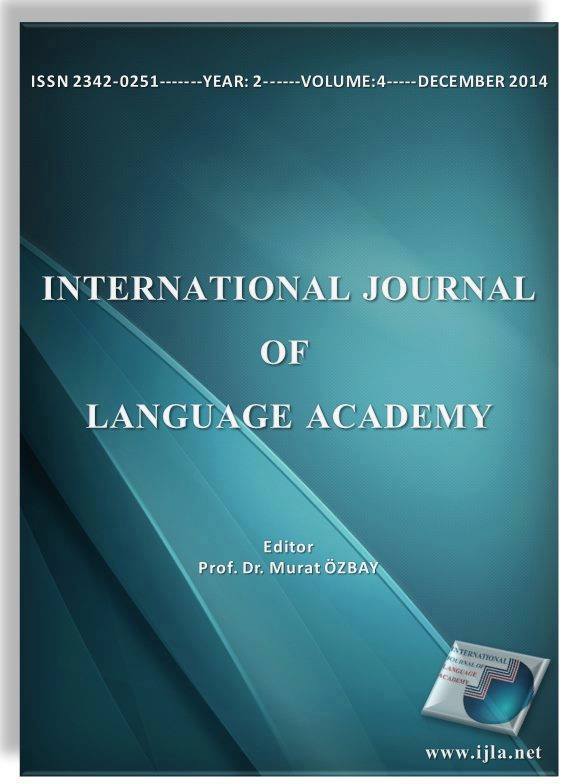Author :
Abstract
Sözlükler, sözcüklerle ilgili herhangi bir bilinmeyen söz konusu olduğunda insanların aklına ilk gelen başvuru kaynaklarından biridir. Bu sözlüklerin, farklı ihtiyaçlara ve farklı kullanıcı gruplarına hitap edebilmesi için hem dilsel bilgileri hem de dil dışı unsurları dikkate alması ve bunları uygun biçimde kullanarak insanlara sunması gerekir. Çünkü bir sözlüğün başarısı/kullanılabilirliği, barındırdığı malzemenin ihtiyaç anında cevap verebilmesi ile eşdeğerdir. Bu yüzden sözlükler, çok geniş kapsamlı ve çok farklı değişkenlerin uyumlu biçimde birbiriyle çalıştığı büyük bir sistem olarak tasarlanırlar. Sözlük bilimi de bu sistemin her anını kontrol eden ve neticede başarılı sonuçlar alınabilmesi için uygun çözümler üreten bir bilim dalıdır. Bu çalışmada, 21. yüzyılın gelişmeleri de dikkate alınarak Türkiye’de ve dünyada sözlük biliminin nasıl algılandığı, nasıl tanımlandığı ve nereye konumlandığı ele alınmıştır. Bunun için sözlük bilimi ile ilgili çalışmalar taranmış, birbiri ile karşılaştırılmış ve yeniden yorumlanarak bir sonuç açıklanmıştır. Araştırmanın neticesinde görülmüştür ki önceleri sözcük biliminin veya dil biliminin içerisinde görülen, bu bilimlerin bir alt dalı veya uygulamalı kolu addedilen sözlük bilimi, günümüzde bağımsız bir bilim dalı olarak kabul edilmektedir. Ancak, dünyada 1980’den itibaren sözlük bilimine ilgi artarken ve süreli yayınlar başta olmak üzere sözlük bilimi ile ilgili pek çok eser yayımlanmışken, Türkiye’de henüz bu duruma gelinememiştir.
Keywords
Abstract
Dictionaries are the first reference guides that come to mind as far as any unknown expression related to words is concerned. In order for these dictionaries to be able to apply to different requirements and different user groups, they should take both the linguistic knowledge and the non-linguistic elements into consideration and present them to people by utilizing them in a proper way, since the success/applicability of a dictionary is equivalent to the capacity of the material/ingredient it contains to respond instantly when required. Therefore, dictionaries are designed as a major system in which quite far-reaching and different variables work in conformity with each other. Lexicography is also the science which controls each moment of this system and produces suitable solutions to achieve successful results after all. In this study, how lexicography is perceived, defined and where it is positioned in Turkey and throughout the world have been discussed by also taking the advancements of the 21st century into consideration. To perform this, the studies in relation to lexicography were reviewed and compared with each other, and the result was clarified through re-intepretation. As the result of this research, it was seen that lexicography, which was once considered to be contained within the lexicology or within linguistics and which was regarded as the sub-branch or applied branch of these sciences, is, today, recognized as an independent science. However, while much interest has been shown to lexicography throughout the world since 1980s, and although several works on lexicography, notably the periodicals, have been published for a long time, such a level has not yet been reached with respect to this science in Turkey.
Keywords
- Akalın, Ş. H. (2010). “Sözcük Bilimi ve Sözlükçülük”, Türk Dili, 698, 162-169.
- Aksan, D. (1998). “Türklerde Sözlükçülük, Bugün Türkiye’de Sözlük”, Kebikeç, 6, 115- 118.
- Aksan, D. (2007). Her Yönüyle Dil Ana Çizgileriyle Dilbilim, C. III, TDK Yayınları, Ankara.
- Atkins, B.T.S., Rundell, M. (2008). The Oxford Guide to Practical Lexicography, Oxford University Pres, New York.
- Aydın, M. (2007). Dilbilim El Kitabı, 3F Yayınevi, İstanbul.
- Ayverdi, İ. (2011). Kubbealtı Lugati-Misalli Büyük Türkçe Sözlük, Kubbealtı Neşriyatı, İstanbul.
- Boz, Erdoğan (2011). “Leksikografi Teriminin Tanımı ve Türkçe Karşılığı Üzerine”, Dil ve Edebiyat Araştırmaları Dergisi, 4, 9-14.
- Burkhanov, I. (1998). Lexicography: A dictionary of Basic Terminology, Wy-dawnic two Wyższej Szkoły Pedagogicznej, Rzeszόw.
- Bussmann, H. (2006). Routledge Dictionary of Language and Linguistics (Trans. and Edt. Gregory Trauth ve Kerstin Kazzazi), Routledge, Taylor & Francis e-Library.
- Crystal, D. (2008). A Dictionary of Linguistics and Phonetics, Blackwell Publıshıng, USA/UK/Australia.
- Dursunoğlu, H. (2011). “Cumhuriyet Döneminde Yapılan Sözlük Çalışmaları ve Türkçe Sözlükler Üzerine Bir Kaynakça Denemesi”, Dumlupınar Üniversitesi Sosyal Bilimler Dergisi, 31, 255-272.
- Fontenelle, T. (2008). “Introduction”, Practical Lexicography–A Reader-, (Edt. Thıerry Fontenelle), Oxford University Press Inc, New York.
- Hartmann, R.R.K. ve JAMES, G. (2002), Dictionary of Lexicography, Routledge/Taylor and Francis, London/New York.
- Hengirmen, M. (1999). Dilbilgisi ve Dilbilim Terimleri Sözlüğü, Engin Yayınevi, Ankara.
- İlhan, N. (2009). “Sözlük Hazırlama İlkeleri, Çeşitleri ve Özellikleri”,Turkish Studies, 4/4, 534-554. http://www.turkishstudies.net/Makaleler/1817068022_ilhannadir.pdf, (Erişim Tarihi 05.01.2010).
- İmer, K; KOCAMAN, A ve ÖZSOY, A. S. (2011). Dilbilim Sözlüğü, Boğaziçi Üniversitesi Yayınevi, İstanbul.
- Jackson, H. (2002). Lexicography an İntroduction, Routledge, London/New York.
- Kirkness, A. (2004). “Lexicography”, The Handbook of Applied Linguistics (Edt. Alan Davies ve Catherine Elder), Blackwell Publishing Ltd., Malden /Oxford/Carlton.
- Kocaman, A. (1998). “Dilbilim, Sözlük, Sözlükçülük”, Kebikeç, 6, 111-113.
- Korkmaz, Z. (2007). Gramer Terimleri Sözlüğü, TDK Yayınları, Ankara.
- Magay, T. (2000), “Teaching Lexicography”, Proceedings of EURALEX 2000, Budapest- Hungary, 443-450.
- %20Lexicography.pdf. (E.T. 10.07.2011).
- Pamir Dietrich, A. (2001). Dictionary of Linguistic Terms, Multilingual Yabancı Dil Yayınları, İstanbul.
- Sterkenburg, P. (2003). A Practical Guide to Lexicography, (Edt. Pietvan Sterkenburg), John Benjamins Publishing Company, Amsterdam/Philadelphia.
- Svensen, B. (2009). A Handbook of Lexicography: The Theory and Practice of Dictionary- Making, Cambridge University Press, UK.
- http://assets.cambridge.org/97805218/81807/excerpt/9780521881807_excerpt.pdf (Erişim Tarihi: 05.11.2014).
- Usta, H. İ. (2010). “Sözlükçülük ve Sözlük Araştırmacılığı”, Modern Türklük Araştırmaları, 7, 2, 92-101.
- Trask, R.L. (2007). Key Concepts in Language and Linguistics, (Edt. Peter Stockwell), Routledge, USA ve Canada.
- Topaloğlu, A. (2010). “Türkçede Genel ve Özel Sözlükler ile Sözlük Yazımı”, Türkiye’de ve Dünya’da Sözlük Yazımı ve Araştırmaları Uluslar Arası Sempozyumu Bildirileri, Kubbealtı Neşriyat, İstanbul.
- Vardar, B. (2002). Açıklamalı Dilbilim Terimleri Sözlüğü, Multılıngual Yabancı Dil
- Yüksekkaya, H. Y. (2001). “Avrupa’daki Modern Sözlük Araştırmaları ve Bu Araştırmaların Türk Metasözlükçülüğüne Yansımaları”, Uluslararası Sözlükbilim Sempozyumu Bildirileri (20-23 Mayıs 1999, Gazimağusa), (Edt. Nurettin DEMİR Emine YILMAZ), Hacettepe Yayınları, Ankara.
- Yüksel, T. (2005). Dilbilgisi Kavramları Sözlüğü, Uyanış Yayınevi, İstanbul.
- Zengin, D. (2010). “Türkçenin Tersine Sözlüğü”, Türkiye’de ve Dünyada Sözlük Yazımı ve Araştırmaları Uluslar Arası Sempozyumu Bildirileri, Kubbealtı Neşriyat, İstanbul.
- http://ijl.oxfordjournals.org/content/by/year (Erişim Tarihi: 10.04.2011).
- http://www.logos.com.tr/tipsoz.asp (Erişim Tarihi: 21.07.2014).
- http://www.sozluksempozyumu.sakarya.edu.tr/ (Erişim Tarihi: 20.09.2014).





